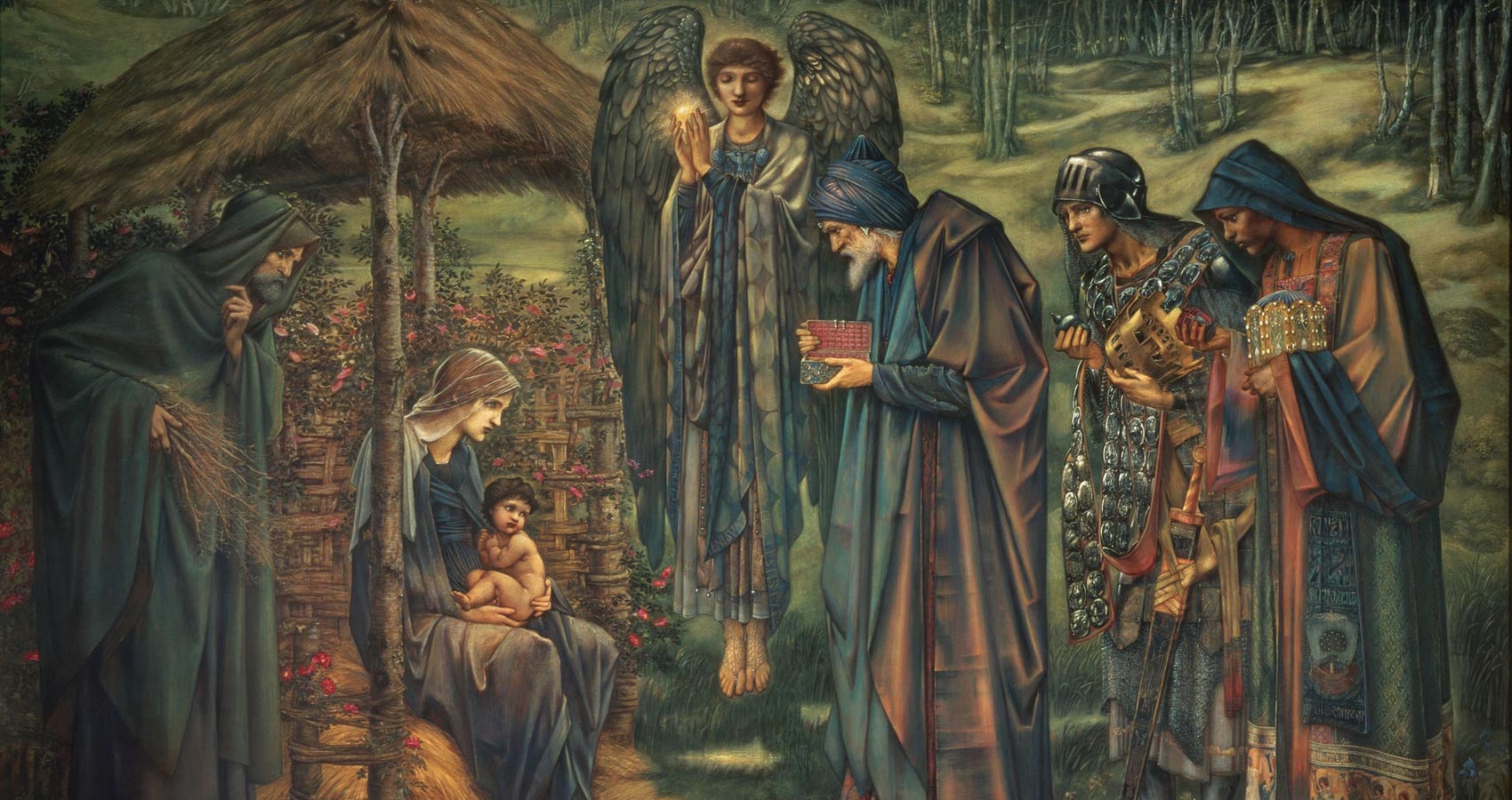Why Believe in God?
The explanation above presumes you believe there is a God. Maybe you don’t believe in God or don’t care whether or not there is a God, but you are at least faintly curious what an informed believer might have to say on the subject. If you do believe in God but need more to convince you that Christianity is the truth, hopefully, the following additional explanation will help.
[Note: Many highly educated folks are atheists, but many are also believers. A number of intellectuals who were staunch atheists have become believers – C. S. Lewis and Francis Collins to name two that are well known. Lewis became a Christian author and his “Mere Christianity” is a classic read for the thinking man. Collins led the successful Human Genome Project and wrote “The Language of God,” a book that explains why this renowned man of science became a believer. If you are searching for the truth with an open mind, I recommend these two books.]

The possibility of God’s existence and the implications for you and me
Let’s start with some simple logic. God either exists or does not exist. If He does not exist, then when we die we no longer exist. Believers and unbelievers end up with the same fate – non-existence. There are no post-death consequences for our bad deeds and no benefits for our good ones – because we no longer exist, and there would be no God beyond the grave who would be our judge and to whom we would be accountable.
What if God does exist? What if He did create the universe and everything in it including mankind? In this case what happens to a person when they die? For the one who believed in God and was reconciled to Him, he has peace with God in heaven. For the one who did not believe in God and therefore did not seek reconciliation, the consequence could not be worse – torment and destruction of the soul in a place the Bible calls hell.
From a purely logical point of view, what makes the most sense, belief or unbelief? Blaise Paschal, a famous French philosopher, scientist, and mathematician (1623-1662) addressed this question in what has been termed “Paschal’s Wager.” If reality were that there is no God, then the believer and unbeliever end up the same – non-existence. If reality were that there is a God, then upon death the believer and unbeliever have drastically different outcomes. What does it cost the believer if he is wrong? During life, he likely lived a better life because he felt accountable to God. After death, it cost him nothing since he would no longer exist. On the other hand, what would it cost the unbeliever if he were wrong? During his brief life on earth, he does as he pleases, but when he dies, he faces torment and destruction in hell. There is a huge gamble here and the stakes are more than enormous. If you gamble there is no God and you are right, what do you gain? Not much – non-existence after death – the same as one who believed. On the other hand, if you are wrong, the consequence could not be worse. And it IS a gamble because there is no way to prove there is no God. One cannot search the extremes of the physical universe much less any parallel universes, and there is no way to search the spiritual realm. If your position were that there is no God, you would have to hold that position by faith. In my view, it actually takes more faith to believe there is no God than to believe there is a God.
For we have eyewitness accounts from credible witnesses as to the supernatural miracles of Jesus but no proof for the case of no God – a case that is essentially blind faith.

How would History look if God exists
Maybe I haven’t convinced you that God exists, but at least by this point you should be considering the possibility that He does. Are you open to this possibility? Are you open to this: that if God does exist and chose to communicate with man over time and intervene in human affairs by coming to earth in the form of a man, it could certainly look like what you see in the Biblical story. A being capable of making the universe and the countless forms and complexity of life on earth and who made man would have no problem doing all the Bible tells us. It IS believable – if you are open to it.
What kind of being is God? What must His attributes be?
Volumes have been written on this, but here I just want to make a few key observations. If God made the physical universe, then He must not be part of it but outside it and greater than it. He is in a different realm. The Bible refers to it as the spiritual realm and declares that God is Spirit. What can we, being part of the closed system of the universe, possibly know about a God whose boundaries are not limited to this physical universe? The answer is only what we can infer from observation and what God chooses to reveal to us. Our observations are limited to the physical realm – (1) what we observe from nature or science and (2) what we observe in the lives of people. Regarding the spiritual realm, we have only what God has chosen to reveal to us via (1) supernatural acts, which are also called signs and miracles, (2) what God chooses to tell directly to certain humans as with the prophets of biblical times and (3) what God told us Himself in the person of Jesus Christ.
What we can know about God from observations of nature and science.
So, then, what kind of being is God? From our observations of the nature and science of the universe, He must have essentially unlimited power to have created it. He must be a being of boundless creativity to have conceived the physical world and life itself including the enormous variety of plant and animal life. He also must be a being of un-imaginable intellect to have architected its complexity including the precision and exactness of all the physical laws such that the universe works and sustains life. For us to be accountable to Him, He must be able to keep track of everything each of us does. That includes hearing, understanding and remembering everything from millions or even billions of people as they pray to Him simultaneously. It is truly mind-boggling for us to try to comprehend a being capable of all this. But consider how big our brains are in comparison to the enormity of the being God has to be. No wonder we can’t comprehend it!

Evidence from our observations of people’s lives
When a person comes to understand and believe the gospel, his life is changed. The degree of change depends on the person’s prior background, ethics, morality and culture. Even one reared in a Christian family and culture will experience life-changing change having come to realize that he has been forgiven and is reconciled to God Almighty! Accepting the truth of God’s grace, mercy and love demonstrated in Jesus’ life and death for us frees us from trying to prove we are “good enough”.
Some think God’s forgiveness gives Christians an excuse, a license to sin. No, God did not compromise righteousness because of His grace. Jesus forgave the woman caught in adultery but then said go and sin no more. Christians have a new reason for righteous behavior, a new motivation for life – showing our thanks for what God has done for us by doing those things that please Him. All believers experience this wonderful change. For some, however, the change is much more dramatic – for example, a staunch atheist coming to believe. Other examples are one coming from a lifestyle of openly blatant wicked behavior and when a firm believer in a false religion comes to faith in Christ. Below I will describe how the lives of four people with different backgrounds were changed when they became believers.

Saul of Tarsus
A Devout Jew who persecuted Christians. Saul lived in the years immediately following Jesus’ time on the earth. He was well-educated and a devout Jew. He had studied Jewish law under leading Jewish teachers of his day and was a member of an elite group of Jewish leaders known as Pharisees. By nature, Saul was a zealous promoter of the Jewish faith – Judaism. With the other Jewish leaders He rejected Jesus’ claim to be their Messiah and considered any Jew believing in Jesus a heretic. He was so adamant about this he set about searching for Jewish followers of Christ and imprisoning them for their heresy. Saul even obtained letters from the High Priest in Jerusalem to take to synagogues in Damascus so that if he found any Christians there he might restrain them and bring them to prison in Jerusalem. While on the road to Damascus, a miraculous event occurred. I quote, “And it came about that as he journeyed, he was approaching Damascus, and suddenly a light from heaven flashed around him; and he fell to the ground and heard a voice saying to him, ‘Saul, Saul, why are you persecuting Me?’ And Saul said, ’Who art Thou, Lord?’ And He said, ‘I am Jesus whom you are persecuting, but rise, and enter the city and it shall be told you what to do.’ And the men who traveled with him stood speechless, hearing the voice, but seeing no one.” Saul became a believer that day. He became just as zealous for Christ as he had been for Judaism. He went on to become the greatest Christian missionary of all time changing his name to Paul. He took Christianity to the Gentile world and wrote much of the New Testament portion of the Bible.

John Newton
A slave trader and ship captain. Born in 1725 in England John left school at age 11 and joined his father’s ship to begin life as a seaman. His early years were one continuous round of rebellion and debauchery. He served on several ships and worked for a time on the islands and mainland of the West African coast collecting slaves for sale to visiting traders. He eventually became captain of his own slave ship. Capturing, selling and transporting black slaves to the plantations of the West Indies and America was a cruel and vicious way of life. In March of 1748, while sailing from Africa back to England during a storm, it looked as if all would be lost. Facing death he began reading a book telling of the gospel of Jesus Christ. The ship didn’t sink, but the message of the book and the frightening experience led to his repentance toward God and faith in Jesus Christ. For the next several years he continued as a slave ship captain, trying to justify it by seeking to improve conditions as much as possible. Eventually, he felt convicted of the inhuman aspects of this work and became a strong and effective crusader against slavery. He quit the sea, got a job back in England, got married and eventually became an avid preacher of the gospel and author of Christian hymns. One of those hymns, “Amazing Grace”, is probably the most beloved Christian hymn of all time.

C.S. Lewis
Scholar and atheist. He was born in Ireland in 1898 to parents able to send him to good boarding schools, prep schools, and college. As a young teenager, after being exposed to various teachings including mythology and the occult, he abandoned his parents’ Christian faith and declared himself an atheist. At age 18 he was awarded a scholarship to Oxford, but first joined the British Army and served as a commissioned officer in World War I. His experience of the horror of war confirmed his atheism. Upon returning from the war he excelled at Oxford and went on to become a long-time professor there in English literature. Influenced by fellow Oxford scholar J. R. R. Tolkien and works by George MacDonald and G. K. Chesterton, with internal struggle all the way Lewis converted to belief in God in 1929 and belief in Christ in 1931. Lewis said of himself the night he believed he was “the most dejected and reluctant convert in all England.” His new faith had a profound effect on his literary works authoring the Christian classics: Mere Christianity, The Problem of Pain, Surprised by Joy, The Great Divorce, The Screwtape Letters, The Chronicles of Narnia, Till We Have Faces, and The Space Trilogy. During the dark days of World War II, he did radio broadcasts about the truth and vitality of Christianity that brought hope to our struggling world. His works have been translated into more than 30 languages and have sold millions of copies. Lewis was very interested in presenting a reasonable case for Christianity. Mere Christianity, The Problem of Pain, and Miracles were all concerned, to one degree or another, with refuting popular objections to Christianity, such as “How could a good God allow pain to exist in the world?”. In addition to his career as an English professor and an author of fiction, Lewis is regarded by many as one of the most influential Christian apologists of his time; Mere Christianity was voted the best book of the twentieth century by Christianity Today in 2000. Due to Lewis’s approach to religious belief as a skeptic, and his following conversion, he has been called “The Apostle to the Skeptics.”

Stan Telchin
A Devout 20th century American Jew. Telchin’s Jewish parents came to the United States from Russia in the early 1900s. He was born on September 14, 1924, in New York City, the youngest of six children, and grew up during the Depression. In December 1944, home on furlough from the army, Telchin ran into a friend from junior high school, Ethel David. After the war, they were married and had two daughters, Judy and Ann. Stan became highly successful in the insurance business and served on the boards of various Jewish organizations. Then in 1974 things changed as Telchin recalls, “Twenty-six years into our marriage, we had a very large home complete with swimming pool, four BMW’s and a full-time housekeeper. Then, just months later, my world felt like it had suddenly come apart.” That’s when Judy, then a student at Boston University, phoned her father to tell him she believed in Jesus. Telchin immediately set out to prove his daughter wrong. On July 3, 1975, after months of studying the Hebrew Scriptures as well as the New Testament, Telchin also came to believe that Jesus is the Jewish Messiah. Then, to his surprise, he discovered that Ethel had independently made the same decision. He wrote the book, Betrayed to describe his experience of learning of his daughter’s belief in Jesus and how he too came to believe after searching out all the relevant scriptures. Stan left the insurance business in 1979 for full-time ministry to Jews trying to help them also understand and believe that Jesus is indeed the Messiah and Savior promised in the Old Testament scriptures. Telchin served with the Jews for Jesus organization from 2003 until his death. David Brickner, executive director of Jews for Jesus, reflected, “Stan had a huge impact on the field of Jewish missions. He will be greatly missed. Even while Stan was in failing health in recent years, his book, Betrayed, remained a strong witness to Jewish seekers and I’m convinced it will keep on making an impact on the lives of our Jewish people in the years ahead.”
All four of these men had radical changes in their lives – they came to faith in Jesus Christ, and as a result, they reached out in love toward their fellow man.

What God has revealed about Himself through supernatural acts
Through the myriad of supernatural acts as recorded in the Bible God has shown that He not only can but does supersede His physical laws when He pleases. He has altered time, made a donkey talk, made an ax head float, turned dry bones into fighting soldiers, miraculously healed the sick and disabled, brought the dead back to life and much more. That God is capable of these things is not surprising considering His capabilities mentioned above. The new information here is not that He can intervene but that He has and does intervene when it suits His purposes.

What God has revealed about Himself through His prophets
Through the overarching providence of God and the inspiration of His Spirit, He has used the Biblical authors to share some other attributes of His. Among the things we learn from them are: that nothing is too difficult for God, that He is the same yesterday, today, and tomorrow, that He is Holy, is just, that He loves us with an everlasting love, that He wants to be our friend, that He is good, that He is merciful and gracious, that He has given us standards for living and wants us to live by them, that He will not be mocked – man will reap what he sows, that He is patient and long-suffering, that He knows the end of a matter at the beginning, that He can change His mind in response to person’s prayer, and that He does not want anyone to end up in hell but wants to forgive all and did all He could to try to achieve this while remaining just.

What God has revealed about Himself directly through Jesus Christ
Finally, when God came to earth in the person of Jesus Christ, He showed us how serious our sin, our disobedience is – it had to be paid for (See Appendix II (below) More on the Need for Salvation). He showed us the extent of His love for us by the extent to which He would go to save man from his sin – namely God Himself would pay the penalty by suffering in our place. He made this salvation, this forgiveness, this reconciliation available to all people as a gift – each person just had to admit his need (repentance) and believe it enough (faith) to accept it – He did not force it on them. God showed us that He could providentially use the affairs of men to accomplish His purposes – namely the crucifixion of Jesus as the vehicle to suffer and pay for man’s sin. Regarding our standards for living, Jesus clarified them (love) embodied in these three commandments, (1) love God with all your heart, soul, mind, and strength, (2) love your neighbor as yourself, and (3) do unto others as you would have them do unto you. Regarding end times, Jesus confirmed that at the end of time, He will return to receive all believers and escort them to heaven. The rest, who rejected God’s patient efforts to get them to repent and believe, will be judged and condemned for their sin and disobedience.

APPENDIX II More on the Need for Salvation
God foresaw the need for man’s salvation before the foundation of the world. “Just as He chose us in Him before the foundation of the world” (Ephesians 1:4). The word us in this verse refers to believers – saved people. He foresaw this need (to be saved) even though He was to create us in His own image and declare that man’s creation was “very good.” “And God created man in His own image, in the image of God He created him, male and female He created them” (Genesis 1:27). “And God saw all that He had made, and behold, it was very good” (Genesis 1:31). How could God declare that His creation of man was very good after having foreseen that something would go wrong with man – something so wrong that it would require God’s intervention to save him? The answer lies in the nature of man.
In choosing to create man in His own image, God created man with intelligence, emotions, and free will. Some have questioned whether man really has free will, but the Bible clearly teaches it. “O Jerusalem, Jerusalem, who kills the prophets and stones those who are sent to her! How often I wanted to gather your children together … and you were unwilling” (Matthew 23:37). “For if I do this voluntarily, I have a reward; but if against my will, I will have a stewardship entrusted me” (1 Corinthians 9:17). “But without your consent, I did not want to do anything, that your goodness should not be as it were by compulsion, but of your own free will” (Philemon 14). Indeed God saw it as “very good” that man has free will, for only a being of free will would be able to have any meaningful relationship with Him. Evangelical Christian author Charles Colson put it well. To create us without freedom of will would be “to create us not as full human beings but as puppets or robots programmed to do only what God wanted. But that would have hindered us from loving God or one another, for genuine love cannot be coerced. Also, without free will, we would not be capable of moral responsibility, creativity, obedience, loyalty, or heroism.”
The point of man’s free will is emphasized here because the need for salvation that God foresaw was a byproduct of free will. God is good and created a perfect world. But because of free will, man had the freedom to obey God or turn away from Him. God foresaw that man would disobey Him. He foresaw sin entering the world, defiling man and all creation. Though God planned to create mankind in such a way that he could possibly sin and then in foreknowledge saw the possibility turn to reality, God is not the author of sin. When we sin, it is our choice – not God’s. We are all born with the propensity to do “what we want” as opposed to doing what our authority wants us to do or what we believe is the right thing to do. This first shows up in a young child’s disobedience to parents. As the child learns about God as the ultimate authority and the concepts of conscience, integrity, and morality and the requirements they place on him, he will sooner or later and with some amount of frequency choose to disobey. He does so because he momentarily wants to, and he can due to his free will. The Bible calls this tendency (to at times do what we believe is wrong) sin. God’s standard for us is to be perfect: “Be ye therefore perfect even as your heavenly Father is perfect.” Matthew 5:48. Though He knows that no matter how hard we try we can’t be perfect, it does not excuse us from trying.
To complete our point about man’s need for salvation, we quote some familiar scriptures. Romans 5:12 tells us “Therefore, just as through one man sin entered into the world, and death through sin, and so death spread to all men because all have sinned.” Romans 3:23 says, “For all have sinned and fall short of the glory of God.” Man’s sin nature – the capacity and inclination to sin – is like an inherited disease. It is passed from parents to children. “Behold, I was brought forth in iniquity, and in sin, my mother conceived me” (Psalm 51:5). The result of sin is physical and Spiritual death. “The soul who sins will die” (Ezekiel 18:4b). “The wages of sin is death” (Romans 6:23a). If God does not save us, the penalty is everlasting punishment in hell. “And if anyone’s name was not found in the book of life, he was thrown into the lake of fire” (Revelation 20:15)
Sin is much worse than we realize. Perhaps, as sinners, we have become desensitized to just how bad it is. But, it is so bad that Holy, righteous, and just God cannot bear to even look upon it. “Thou art of purer eyes than to behold evil, and canst not look upon iniquity” (Habakkuk 1:13 KJV). Upon confronting the holiness of God, Isaiah proclaimed, “Woe is me, for I am ruined! Because I am a man of unclean lips, and I live among a people of unclean lips; for my eyes have seen the King, the Lord of hosts” (Isaiah 6:5). As sinners, we are totally ruined, condemned to death, hell and eternal separation from God. But, as discussed above, before creation God foresaw the evil of sin contaminating man and the world, and therefore, before creation he also planned a way for man to be saved – the gospel message stated above.
